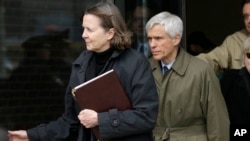With her arm around the young man's back, she gives him a gentle pat and leans in to whisper something to him. Judy Clarke could be his mother - with this simple, comforting gesture - but she is not.
She is a defense lawyer and he has been found guilty on all counts related to bombing the Boston Marathon.
Clarke has defended others accused of horrific and infamous crimes, including Unabomber Ted Kaczynski, Atlanta Olympics bomber Eric Rudolph and Arizona shooter Jared Lee Loughner, who killed six people and injured 13 others, including U.S. Rep. Gabrielle Giffords, in 2011.
She saved all of them from the death penalty and hopes to do the same for Dzhokhar Tsarnaev, the man accused in the 2013 Marathon bombing that killed three people and injured more than 260 others.
Tough odds
In what has become a familiar refrain in Clarke's career, she faces tough odds. Tsarnaev, 21, was convicted of all 30 charges he faced, including 17 that carry a possible death penalty.
Lawyers who have worked with her say the same gentle quality she has shown with Tsarnaev has helped her connect with her other clients and, in turn, helped save their lives.
"During a time when the world was focused on my brother as a monster, she was able to see him as a human being and provide him with that kind of human contact and emotional support at a time when he had very little sympathy from anyone," said David Kaczynski, who made the difficult decision to turn in his brother after he suspected him in a series of bombings that killed three people and injured 23 others between 1978 and 1995.
"She really sees each human being as a human being and defines them not in terms of what they may have done or how sick they may be or how fanatical they may be, but through a kind of human core," Kaczynski said.
Clarke, who grew up in Asheville, North Carolina, later told her local newspaper that she knew she wanted to be a lawyer at a young age.
"In the seventh grade, I decided I should be Perry Mason or Earl Warren," she told The Asheville Citizen-Times in 1995.
'Dealing with liberty'
Clarke said she found it natural to devote her career to defending the accused.
"You're dealing with liberty," she told the newspaper. "It's the ultimate in legal issues to me, whether or not someone is free."
Clarke began her career as a federal public defender in San Diego and Spokane, Washington. A staunch death penalty opponent, she agreed in 1994 to help represent Susan Smith, a South Carolina woman who drowned her two young boys by letting her car roll into a lake with her children buckled into their car seats.
Prosecutors portrayed Smith as a selfish woman who killed her children because she saw them as an obstacle to being with a man who had broken off their relationship a week earlier.
But Clarke described Smith as "one of the walking wounded," and told the jury about her troubled childhood: her father committed suicide when she was six, she was molested by her stepfather, and she made two suicide attempts of her own as a teenager. Clarke said the drownings of her boys were part of another failed suicide attempt by a woman who "tried to cope with a failing life and snapped."
Lead prosecutor Tommy Pope said Clarke began to humanize Smith well before the jury had to make a decision on whether she received the death penalty. He recalled Clarke telling jurors the defense wasn't looking for their sympathy, but for their "understanding" of Smith.
"I think she took advantage of opportunities so by the time they got to the courtroom, I think the jury was more willing to hear the softer side or the human side of Susan Smith," Pope said.
In the Loughner case, Clarke negotiated an agreement with prosecutors that spared him the death penalty in exchange for a guilty plea to 19 charges.
Jon Sands, the chief federal public defender for Arizona who recommended Clarke for the job, said she understands the pain the victims have suffered as well as the turmoil her clients have experienced.
"She often is very good at letting the prosecutor and the victims know why settling is in their interest, and you saw that in Loughner," Sands said. "She and her team ... were constantly meeting with Loughner and getting experts until the prosecution understood that he was terribly, terribly mentally ill and it was in everyone's best interests for him to take a plea."
Unassuming style
In the Tsarnaev case, the U.S. Department of Justice has given no indication that it will entertain a plea agreement that would spare Tsarnaev's life.
Clarke and the rest of Tsarnaev's defense team began signaling their defense more than a year ago, indicating in court documents that they plan to argue that Tsarnaev was influenced -- maybe even coerced -- into participating in the bombings by his older brother, Tamerlan, who was killed in a shootout with police days later.
In court, Clarke has been soft-spoken and respectful when questioning prospective jurors.
With her plain, monochromatic suits, pageboy haircut and no makeup, Clarke, 62, has a modest, unassuming way about her. She declined a request to be interviewed, but instead suggested a story on her co-counsel, David Bruck, or the team of federal public defenders also working on the Tsarnaev case.
In a rare public speech about her work, Clarke told an audience at Loyola Law School in 2013 that many people charged with capital crimes have suffered severe trauma and cognitive development issues. She said many of her clients have been reluctant to plead guilty when she first meets them.
"They're looking into the lens of life in prison in a box," she said. "Our job is to provide them with a reason to live."









